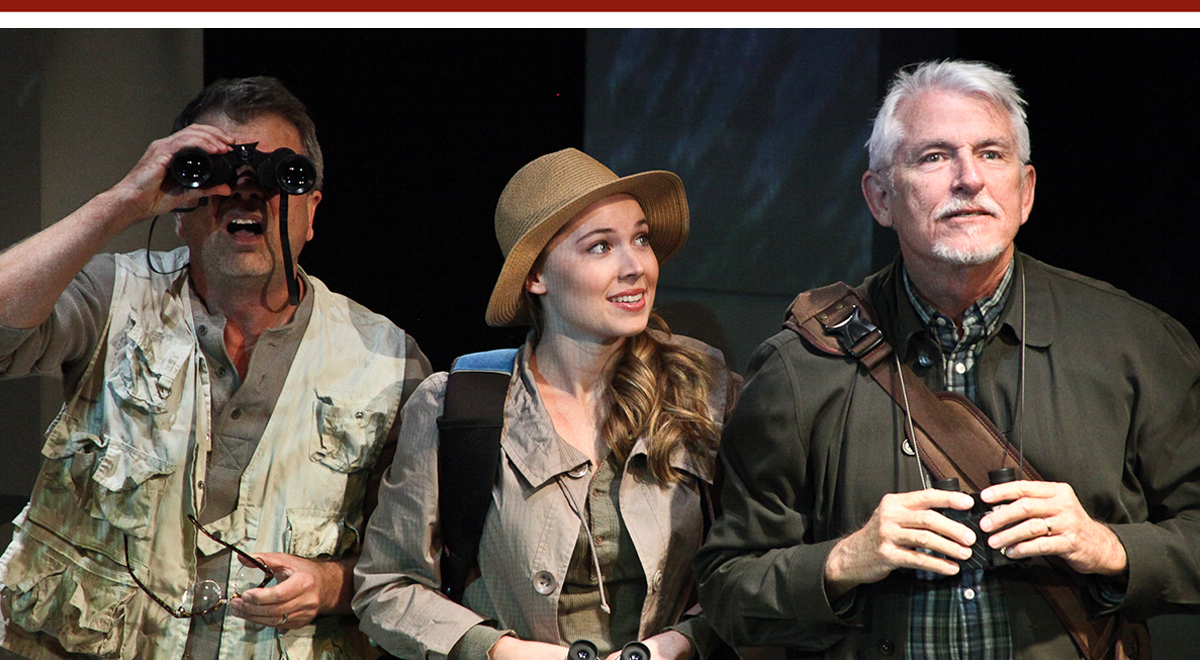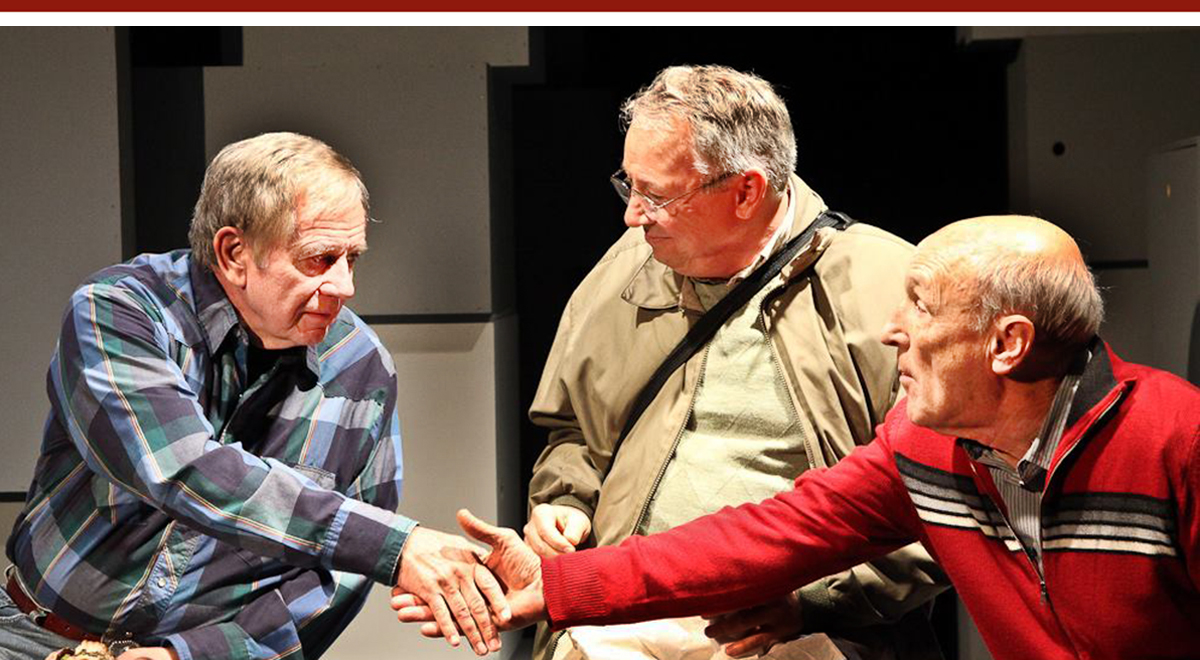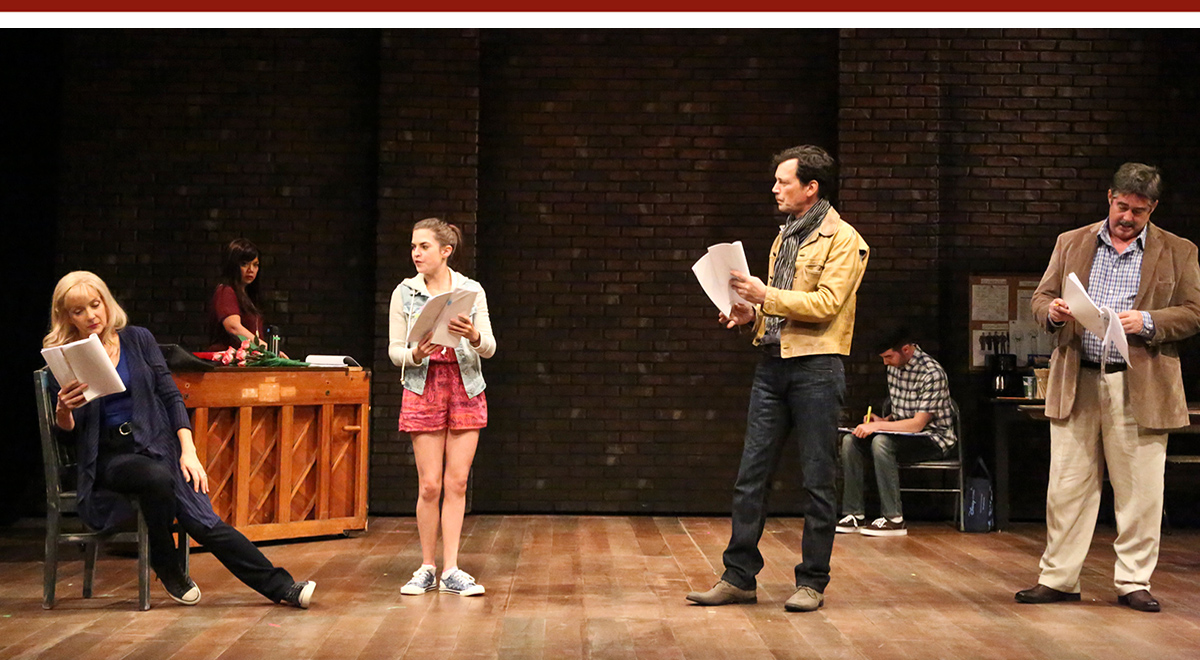MAY 2016
Click title to jump to review
AMADEUS by Peter Shaffer | South Coast Repertory
BIRDER by Julie Marie Myatt | Road Theatre
JOHN IS A FATHER by Julie Marie Myatt | Road Theatre
STAGE KISS by Sarah Ruhl | Geffen Playhouse
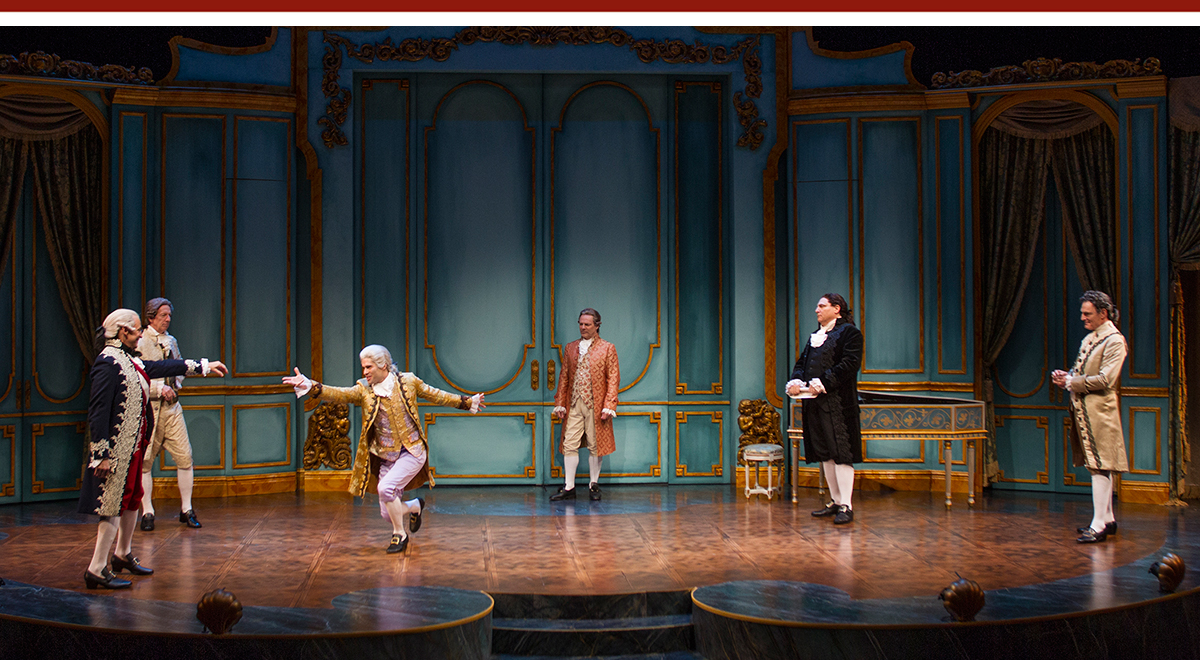
Shaffer's Shakespearean Salieri
In 1979, Peter Shaffer created an expansive stage drama that explored opposing aspects of human nature: crippling jealousy and incomprehensible creativity. Although Amadeus's themes were Shakespearean in breadth and its characters rooted in history, it felt original and fresh.
Amadeus became a theatrical milestone, winning the Best Play Tony® in 1981 and the Best Picture Oscar® for its film adaptation three years later. In between awards, South Coast Repertory's staging by John Allison started the theater on a mid-'80s run of LA Drama Critics Circle success. The Costa Mesa company has now remounted it under Kent Nicholson's direction (through June 5), with Marco Barricelli as composer Antonio Salieri and Asher Grodman as Wolfgang Amadeus Mozart.
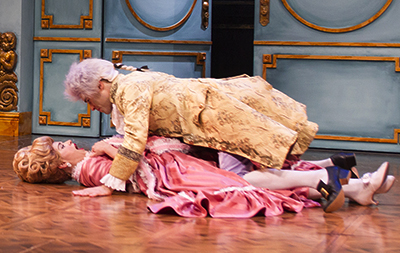
Shaffer [who died in Ireland at 90 the day after this production closed] was criticized for his characterizations of the two composers. There is little evidence to support the depiction of Mozart as childish and profane or that he died of poisoning. However, Shaffer was writing history through the lens of psychology. He structured the play to be from the perspective of its narrator, an old man who history shows was in failing mental health. He is introduced by his gossip-collecting Venticelli ("Little Winds"), who tell us the city of Vienna is abuzz with accusations that 32 years before, Mozart was killed … by Salieri. When we meet the aged Salieri, he speaks as if hovering between this world and eternity, welcoming the audience as "Ghosts of the Future … waiting for your turn to live."
In the exhaustive salieri-online.com biography, as Salieri's health declined in his final decade, rumors that Mozart had been murdered intensified and then "zeroed in on Salieri. Over the remaining years of his life this would cause increasing grief and eventually depression. In 1823 his health worsened and at one point he fell, sustaining a head injury. From that point on Salieri's mental condition was characterized by confusion. In October of that year he was admitted to the Vienna Allgemeine Krankenhaus hospital from which point the gossip ran rampant."

In this way Shaffer sets up what English professors call the "Unreliable Narrator," someone whose version of the events are suspect. This not only explains why much is accurate while much is not, it is valuable to note those elements that have been twisted by the composer.
Salieri was a monumental enough role to attract Paul Scofield for the London premiere and Ian McKellan on Broadway. Nicholson and SCR were fortunate to cast Barricelli, the man who 20 years earlier provided the Petruchio for Mark Rucker's breakthrough staging of The Taming of the Shrew. Since then he was a core company member at San Francisco's ACT and then Artistic Director of Shakespeare Santa Cruz.
Barricelli's Salieri is composed, distinguished. His welcoming convocation and farewell to the future ghosts who create the audience are measured and betray no sign of dementia. Not until his arch, ill-fitting final pose, in which he reaches out towards us, does anything seem strange. His narration seems reliable, unless we know the truth or until we discover it later. His characterization of Mozart has been twisted to support a personal belief formed in a heart blackened by envy but rationalized in a keen mind.
Salieri has come to believe that first of all, God has the ability to share the divine power of creation with mortals. Furthermore, he is convinced that, in his own field of music, He has unwisely chosen to bestow that gift on a crude, unworthy creature. And what really drives Salieri around the bend is that he, the more deserving vessel for Almighty inspiration, may be the only person living who appreciates the magnitude of Mozart's music.
Barricelli's Salieri is a controlled presence, which helps move the nearly three-hour production along. He is an amiable guide and we completely sympathize. But we also sympathize with Grodman's Mozart, whose genius and frustration both manage to show through Salieri's prejudiced portrait. A highlight of this production is Peter Frechette as Emperor Joseph II, who also suffers somewhat in Salieri's telling. Though history credits him as one of the three great monarchs of the enlightenment, here he is somewhat foolish, dismissing Mozart's majestic music as having "Too many notes."
Nicholson's cast also features a supreme court of actors in Bo Foxworth as , Geoffrey Wade as , John-David Keller as , and especially Mark Capri as . Louis Lotorto and Christian Barillas are the Venticelli, and Liesel Allen Yeager is a strong Constanze.
John Iacovelli has designed a versatile set, which Lap Chi Chu lights beautifully and Alex Jaeger dresses with lavish costumes. Ken Merckx is on hand for the few fight scenes, and Victor Zupanc has provided additional composition as well as the piano performances used.
top of page
AMADEUS
by PETER SHAFFER
directed by KENT NICHOLSON
SOUTH COAST REPERTORY
May 6-June 5, 2016
(Opened 5/13, Rev’d 5/29m)
CAST Christian Barillas, Marco Barricelli, Mark Capri, Bo Foxworth, Peter Frechette, Asher Grodman, John-David Keller, Louis Lotorto, Cyhtina Marty, Louis Pardo, A.J. Sclafani, Camille Thornton-Alson, Geoffrey Wade, Liesel Allen Yeager
PRODUCTION John Iacovelli, set; Alex Jaeger, costumes; Lap Chi Chu, lights; Darron L West, sound; Philip D. Thompson, accent/language; Victor Zupanc, additional composition/piano; Ken Merckx, fights; Joanne DeNaut, casting; Jennifer Ellen Butler/Talia Crispel, stage management
HISTORY Premiered at the National Theatre in 1979 and arrived the following year on Broadway, where it earned the Tony® Award for Best Play. In 1984, Shaffer adapted it into a film directed by Milos Forman that would win the Academy Award for Best Picture.
Peter Frechette, Geoffrey Wade, Asher Grodman, Bo Foxworth, Marco Barricelli and Mark Capri , top; middle, Grodman atop Liesel Allen Yeager; and bottom, Barricelli
Debora Robinson
The leaves are always greener…
Roger is a confused character who with the forbearance of a forgiving wife manages to stumble his way to clarity. However, there's a chicken-and-egg question as to whether a lack of character or being stuck in an inappropriate role has caused him to abandon his duties and embrace denial. In Dan Bonnell's world premiere at The Road Theatre (through June 29), Roger's confusion adds confusion to Julie Marie Myatt's otherwise engaging Birder.
In repertory with John is a Father, a stronger and fully realized piece (reviewed below), Birder is a welcome opportunity for a double shot of this accomplished contemporary writer. If one is seeing only one production, it should be that one, and if one is seeing only this one, a return trip for John is urged.

It is realistic that Roger, as our field guide into his own mind, is unable or subconsciously resistant to grasp the true nature of his behavior. In Chet Grisson's performance, he is an amiable, somewhat goofy, follower of the flock who pursued the American Dream past his ability to pay for it. Now he is, both financially and psychologically, in Icarus descent.
It is also realistic that Roger has chickened out of telling dream wife Joyce (Laurie Okin) that their lifestyle has become unsustainable. And, that his career as an accountant is now unable to cover their expenses or hold his interest. At some point he stopped going to the office, effectively quitting. Instead, he takes the kids to school and then heads for Starbucks or indulges his new pastime of bird watching.
The interest in birds was sparked one day when Roger stared into the cold black eyes of a house finch and imagined the creature had seen his inner truth and sanctified it. Though he has no interest in fashion himself, Roger does note the attractive red coloring of the male finch, a gender distinction that is harbinger of the role-reversal with Joyce later in the play. Roger would likely defend his epiphany as did Peter Finch's Howard Beale in Paddy Chayefsky's Network: "This is not a psychotic episode. It is a cleansing moment of clarity." However, both are sadly mistaken.
He does openly and with Joyce's agreement join a small band of birdwatchers led by Charles (Webster Williams). He seems to want Charles to serve as mentor and father figure, but not enough to be on time and pay attention. He seems more dedicated to hitting on Charles cute daughter, Rebecca (Monique Marie Gelineau), who is too nice to tell him to knock it off. While Joyce suffers Roger's disinterest in bed, Roger's flirting turns obsessive, and he attempts to undermine Rebecca's romance with dream boyfriend Todd (Crash Buist).
Once the utility shut-off notices begin appearing, Joyce gets concerned. Roger will continue to maintain his lie about going to work, and then finally confess. Now Joyce becomes breadwinner, switching all roles including withholding sex. It is here she gets to address the audience. Roger will eventually find a way of supplementing the family income as a happy, well-adjusted bus driver serving airport passengers and keeping his binoculars handy to check out his abiding interests in the branches.
The play's timeline goes back and forth, which is signaled in supertitles projected onto the uneven surface of Tom Buderwitz's abstract set. They're easy to miss, and by the time one notices one among the leafy images of Tom Ontiveros' slide montage, it may be too late to get yourself situated, especially since things seemed to be progressing along a forward motion anyway.
The play moves briskly and the rest of the cast provide fine support for Grissom. Okin (last seen in Catherine Butterfield's Brownstone, credited as Laurie Naughton) is especially good. Bonnell's design team is the same as on John is a Father and the single set again serves this production beautifully.
top of page
BIRDER
by JULIE MARIE MYATT
directed by DAN BONNELL
THE ROAD THEATRE
April 29-June 19, 2016
(Opened 4/29, Rev’d 5/14e)
CAST Crash Buist, Monique Marie Gelineau, Chet Grissom, Laurie Okin, Webster Williams
PRODUCTION Tom Buderwitz, set; Michele Young, costumes; Tom Ontiveros, lights/projections; David B. Marlin, sound; Maurie Gonzalez, stage management
HISTORY Commissioned and developed by Center Theatre Group, and supported by grants from the City of L.A.'s Department of Cultural Affairs World premiere
Chet Grissom, Monique Marie Gelineau and Webster Williams, top; inset, Laurie Okin and Grissom
Michele Young
Heart of darkness
Every elder among us carries a decades-long backstory. These are of little interest in a future-facing world, and that is good news for those who need to keep their history hidden. In Julie Marie Myatt's new John is a Father, receiving its world premiere at The Road Theatre (extended through July 16), one man must confront his horrific backstory so that his grandson will understand his.
Myatt, director Dan Bonnell, and a fine cast are in emotional sync for a 90-minute theater experience that proves as deeply satisfying and seemingly timeless as something discovered in a classic short story anthology. As with her My Wandering Boy, Someday, and Ted Schmitt Award-winning The Happy Ones, there's a dark, yearning heart lying solidly at the play's center of gravity, and a carefully constructed path to take us to it.

John Owens is a man in his mid-to-late 60s, stooped under the burden of his own brutal behavior half-a-lifetime ago. In a textbook example of restrained exposition, backstory gradually comes to light over the one-act's three main scenes. As we move forward through the play, the details become clearer, like larger and larger bits of wreckage leading back to the point of impact.
When we meet John (Sam Anderson), he has a worn softness. In his cowboy hat and Western wear he makes his daily delivery of fresh fruit to sleepy Edward (Mark Costello), a homeless Vietnam veteran cocooned among his possessions on an L.A. street. The extra apple and banana signal that John will be away the next day. Edward pesters him into divulging that he is flying to Phoenix for a first meeting with his 7-year-old grandson. John promises to honor Edward's request for some airline souvenir.
Myatt inserts a short entr'acte of John silently packing. He clasps closed his case, moves towards the door, and then sits on the bed, clearly wanting to back out.
For the second major scene we are in the airport waiting area, established by the black and white video in Tom Ontiveros' excellent projection design. He is quietly eating a pre-flight sandwich when an elderly gay couple asks if he'll slide over so they can sit together. Kenneth (Carl J. Johnson) and Douglas (John Gowans) will draw out more of John's backstory for us in a fascinating way. United by decades together, the same-sex partners can be seen as two aspects of a single self. Kenneth, the extrovert, is the half who is unhesitating in his interest and concern for a stranger: Douglas represents the side of us that smiles and keeps reading, choosing not to interact in the name of respecting privacy. Kenneth's persistent inquiries will get John to reveal much more about himself. It's a beautiful section that provides a rare opportunity for meaty scene work by three older actors.
In the second entr'acte spacer, a sitcom flickers television light and laughter into a dim motel room where John is dreading what's next. We move to the Phoenix apartment of Patricia (Hilary J. Schwartz). In the previous two encounters we have learned that John has never met Patricia, his widowed daughter-in-law, or her son Reggie. We know John's son, Henry, died as a soldier in Afghanistan. However, John's shuffling disclosures about the distances in his family ended there. Now, interested only in her husband's memory and her son's future, Patricia will maneuver John into come-clean confession. And, when Reggie (Jackson Cole Dollinger alternating with Elliot Decker), arrives home from soccer practice, his innocent embrace will provide a final absolution.
Anderson, Road Theatre's Artistic Director, inhabits John's reluctant willingness with the quiet stoicism of a man practiced at concealing his turmoil. It's a performance that forgoes fireworks for solemn honesty. It's a beautifully cast and directed production, and Bonnell lets the actors err on the side of taking the pace as they feel it. It is unrushed, but never indulgent. A couple of protracted moments – John staring at his son's picture, John pressed against the exit – could use an action (picking up the picture; turning the knob) to give Anderson some physicality that heightens rather than intrudes upon his focus.
Johnson has been given a wonderful opportunity in Kenneth and he has created a very special soul in response. Gowans and Costello are also spot on, while Schwartz creates a Patricia with the steely understanding and perspective that is the nature of a Myatt universe.
In a final wordless coda, John delivers Edward his requested souvenir, a copy of the American Express inflight. The luxury lifestyle magazine is an odd choice for a homeless man, but in its echo of the generous Kenneth, who insisted John take his TIME on the flight, it suggests a move to openness. Now, as John lays it down on Edward's vacant concrete bed, beside newly placed memorial flowers and votive candles, the periodical's name underscores why we must err on the side of interest and concern: Departures.
top of page
JOHN IS A FATHER
by JULIE MARIE MYATT
directed by DAN BONNELL
THE ROAD THEATRE
May 9-July 3, 2016 (extended to July 16)
(Opened 5/12, Rev’d 5/14m)
CAST Sam Anderson, Mark Costello, Jackson Cole Dollinger (alternating with Elliot Decker), John Gowans, Carl Johnson and Hilary J. Schwartz
PRODUCTION Tom Buderwitz, set; Michele Young, costumes; Tom Ontiveros, lights/projections; David B. Marlin, sound; Maurie Gonzalez, stage management
HISTORY Produced by Donna Simone Johnson and Ann Hearn. World premiere
Sam Anderson, Carl J. Johnson and John Gowans, top; inset, Anderson and Hilary J. Schwartz
Michele Young
The smack of reality
Laughter is the best medicine and laughing at oneself the best antidote for a swelled head. Playwrights and screenwriters long ago came up with a way to treat theatrical egos and attract big audiences while doing it. They created a sub-genre of backstage comedy in which, despite the best efforts of well-meaning thespians, the play they're staging careens into farce. Sarah Ruhl's 2011 Stage Kiss, at the Geffen Playhouse through May 15, is a wonderful case in point.
Under director Bart DeLorenzo's care, a crack cast of seven provide the expert timing to give the play and the play within it a hilarious airing. As is her practice, Ms. Ruhl wants the script to provoke more than laughter. A variety of prescriptions for greater awareness are tucked into previous plays, such as Clean House, In the Next Room, or, The Vibrator Play, and even the quasi-backstage epic, Passion Play. In Stage Kiss we can detect the symptoms of unhealthy relationships and gain insight into how to better treat them. Ms Ruhl signals that there is generic applications by giving categorical names to half her characters: she, he, husband and director. However, it does require a little time for the more serious subtexting to land among the laughs, which can slow the show's pulse here and there and add occasional lulls to the steady stream of LOLs.

Leading the cast is Glenne Headly, who launched her career in the Steppenwolf Theatre ensemble and came to national attention holding her own with two masters of timing, Michael Caine and Steve Martin, in the film Dirty Rotten Scoundrels. Here she works with another comedy ace, Stephen Caffrey, and a solid line-up of Tim Bagley, Melody Butui, Barry Del Shannon, Matthew Scott Montgomery, and Emily James. James, an impressive young talent, came to our attention while holding her own with two stage giants, John de Lancie and Jon Tenney, in the 2015 premiere of Rajiv Joseph's Mr. Wolf.
A theater director, Bagley, is casting a revival of a little remembered 1932 comedy called The Last Kiss, in which a dying married woman has an extramarital affair with the love of her life, a dashing cad who has resurfaced after abandoning her years before. It is just what she needs to rejuvenate. After the auditioning actress, Headly, gets the part, she learns that she will be playing opposite the love of her life, Del Sherman, a dashing cad who abandoned her years ago. She has since married a wealthy, solid entrepreneur, Caffrey, and had a daughter, James, who is now a rebellious teenager. Assisting with the audition, and playing various roles in Stage Kiss and The Last Kiss are Butiu (a 2007 Rearview Citee) and Montgomery.
Stage Kiss' blurring of the line between theater and reality is great fun. While watching one may remember any number of great examples of the sub-genre: Jeffrey Hatcher's Stage Beauty, for the deeper questioning of identity through actor-role confusion; Michael Frayn’s Noises Off, the most successful example of stage calamity in recent years; and even, for the additional layering of role-swapping, the work of Alan Ayckbourn.
DiLorenzo has exercised his usual mastery of casting, with the aid of the Geffen's Phyllis Schuringa. Headly has the right ease with a comic moment, never forcing but coaxing the laugh at every opportunity. Caffrey and Bagley are also stand-outs. And it is great to see Ms. James. Del Sherman, Butui and Matthew Scott Montgomery contributing such great work as well.
The design team of Keith Mitchell (set), David Kay Micklesen (costumes), Lap Chi Chu (lights) and John Ballinger (music and sound) help give the Geffen stage a fun house mirror for those who have spent serious time backstage. It may have been inappropriate to laugh when it was the real world, but thanks to Ms. Ruhl and Mr. DeLorenzo, we now can laugh till it hurts.
top of page
STAGE KISS
by SARAH RUHL
directed by BART DE LORENZO
GEFFEN PLAYHOUSE
April 5-May 15, 2016
(Opened 4/13, Rev’d 4/22)
CAST Tim Bagley, Melody Butiu, Stephen Caffrey, Barry Del Sherman, Glenne Headly, Emily James, Matthew Scott Montgomery
PRODUCTION Keith Mitchell, set; David Kay Mickelsen, costumes; Lap Chi Chu, lights; John Ballinger, music/sound; Phyllis Schuringa, casting; Jennifer Brienen/Cate Cundiff, stage management
HISTORY Originally produced by the Goodman Theatre in May 2011; New York premiere at Playwrights Horizons in 2014


